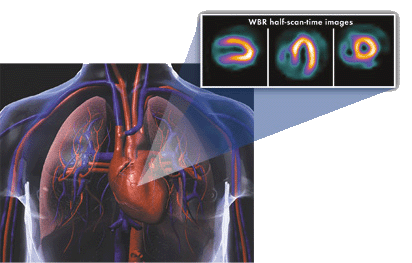January 3, 2014 — As the global medical isotope shortage continues indefinitely following the plant leak in South Africa, Berks Cardiologists Ltd., a cardiovascular imaging center in central Pennsylvania, is continuing to operate at the same procedure volume and with their lower-dose cardiac
nuclear medicine imaging protocols. The facility relies on software from UltraSPECT, a provider of image reconstruction technology that reduces
radiopharmaceutical dose and acquisition time for nuclear medicine (NM) exams.
Berks Cardiologists is a private practice in Wyomissing, Penn. with a staff that includes 14 cardiologists and performs about 100
SPECT exams a week. The practice was initially looking for software to improve their image quality and found a solution that only provides them with high-resolution images and the ability to use half the injected dose of the
nuclear imaging agent Technetium-99m (Tc-99m).
"Wide Beam Reconstruction technology from UltraSPECT has been instrumental in our ability to maintain our high patient throughput throughout this technetium shortage,” said James Reibsane, CNMT, director of diagnostic and technical services, Berks. “With our protocol of low-dose imaging, our business operations continue, and our patients are all imaged as planned and as needed. Few cardiovascular imaging facilities across the country can say the same.”
Shortages of Tc-99m can have significant impact on healthcare facilities’ operations and, more significantly, on the care of their patients. Without a solution like the low dose software from UltraSPECT, implications can include:
-Inability to provide patients with the necessary nuclear medicine tests
-Delays and rescheduling of exams for patients
-The need to send high-risk patients for interventional procedures without the most necessary test results
-Loss of revenue to a practice
“Since the heavy shortage in 2009, it is known that nuclear isotope shortages are guaranteed to happen and are nearly always unexpected,” said Yossi Srour, president and CEO, UltraSPECT. “Low dose protocols are needed now more than ever with the increase in these shortages combined with the ongoing implementation of low dose ASNC guidelines.”
UltraSPECT’s Xpress3.Cardiac solution uses the company’s exclusive WBR (wide-beam reconstruction) technology to deliver half-dose cardiac imaging with high image quality and undiminished diagnostic certainty. It minimizes the radiation dose to both the patients and the staff administering the exams.
For more information: www.ultraspect.com


